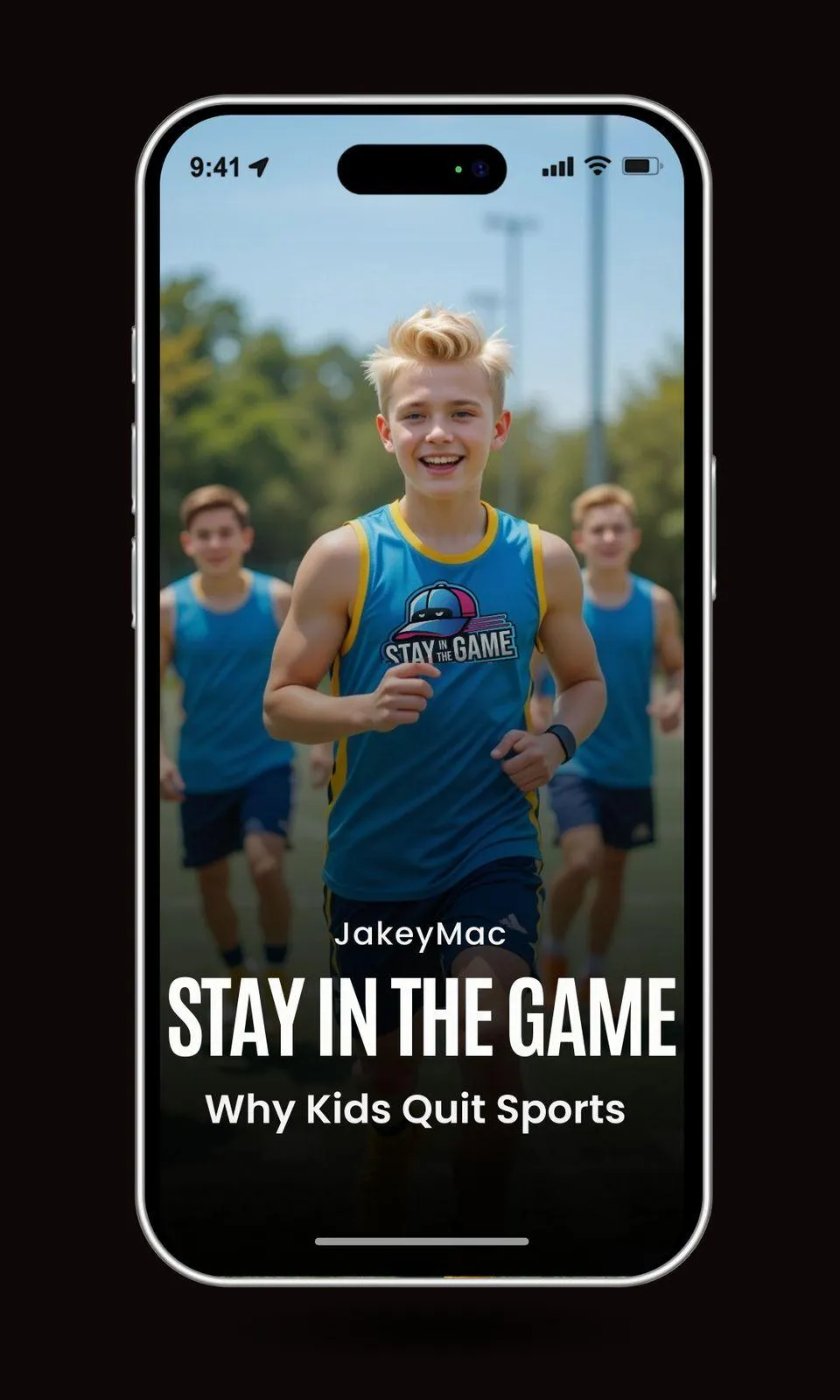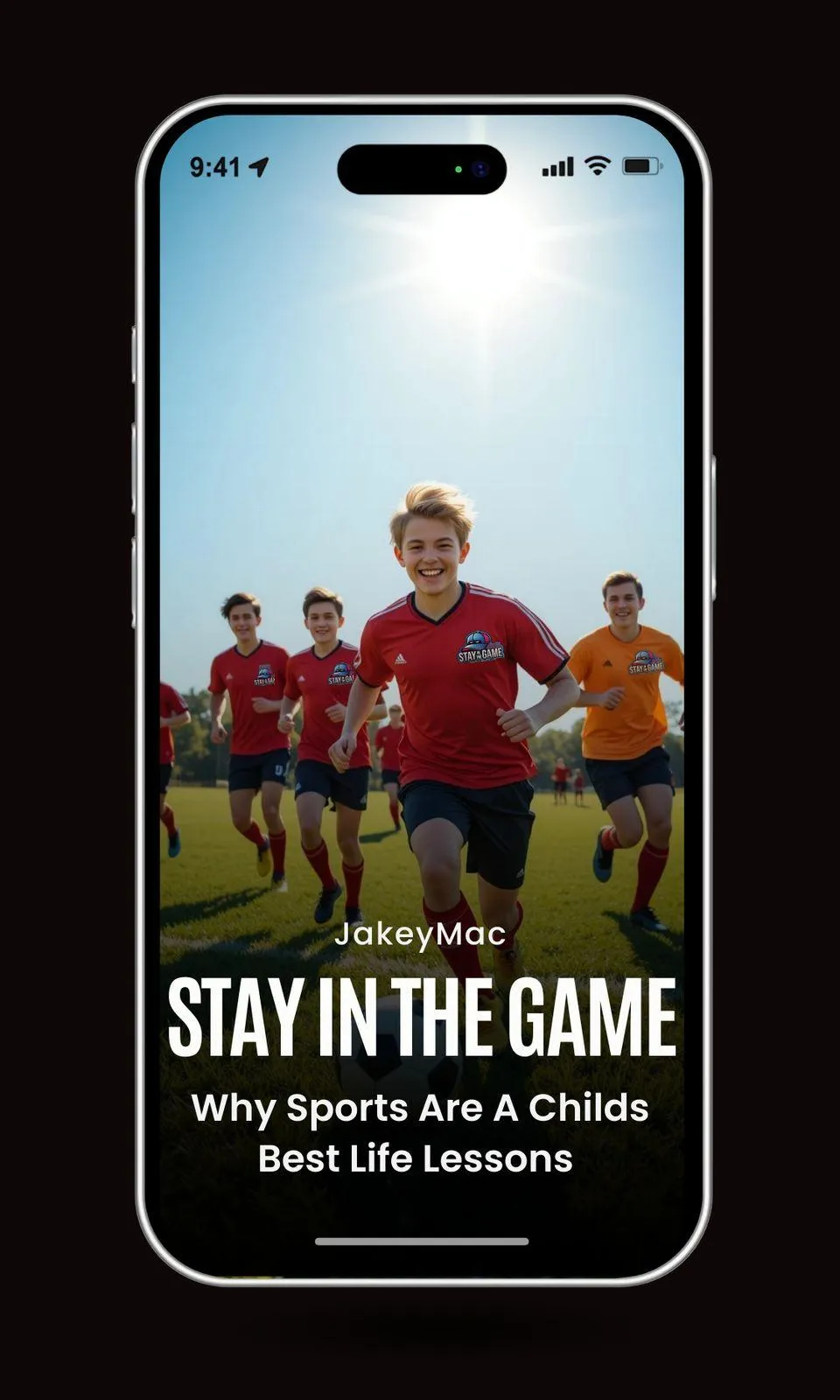Stay In The Game – Learn The Importance Of Sport For A Successful Life
Stay In The Game – A Step-By-Step Guide To Create Your Best Life Thru Sports
About
Thinking About Quitting Sports? DON’T.
Right now, it’s getting tougher—coaches push, parents expect more, and the fun isn’t the same. That’s when most kids quit… and they regret it forever. Stay In The Game reveals why quitting is the worst move and how sports build grit, confidence, Life-long-friendships and are the cornerstone for a life of success. Come inside before it’s too late. Learn why “Staying Tn The Game” changes everything!
DISCOVER THE POWER IN YOU
WITH OUR (SMS) SUCCESS MAPPING SYSTEM
Using Our Proprietary ( SMS ) Success-Mapping System You Identify Your Key Personality Traits, Desires, And Drivers Necessary To Succeed. We Guide You Through A Structured Process To Create Your Ideal Lifestyle, Future Career, And Mentor You Step By Step To A Life Of Success.




STAY UnTIL YOU WIN
75% of all Fortune 500 CEO’s Played Sports. The lessons they learned created world leaders. Don’t Miss Out? Stay In The Game teaches you how to leverage all your hard work and apply what sports taught you create a successful life.
Ready to start?
Take the first step now—unlock The Power In You and learn to design the life that’s perfect for YOU!

MEMBERSHIP PLANS
Basic
Billed every Month $10/month ($99/year)
What’s Included:
Access to basic challenges.
Earn up to the Warrior rank.
Leaderboards, and a private online community.
A private online community.
Pro
Billed every Month $25/month ($249/year)
What’s Included:
Includes Fearless and Free training kits (e.g., resistance bands, journals).
Unlocks advanced Champion-level challenges.
Entry into monthly prize competitions.
Elite
Billed every Month $49/month ($499/year)
What’s Included:
Includes personalized coaching, Elite Squad apparel, and VIP event invitations.
Unlocks Master-level challenges.
Elite Squad apparel.
VIP event invitations.
Monthly achievement reports mentor call.
Leadership Training.
Mentor call.
LifeMapz
One -time payment $997
What’s Included:
Full access for life.
Custom Fearless Free challenge gear.
Special rank recognition.
Free challenge gear.
Frequently Asked Questions
Why should my child stay in sports?
Sports build leadership, discipline, and teamwork—skills that help kids succeed in life and future careers
Do athletes earn more money in their careers?
Yes! Former athletes earn 15% more money due to their work ethic, resilience, and teamwork skills
How does playing sports help kids succeed in life?
Sports develop perseverance, confidence, and problem-solving, which are essential for academic, personal, and career success.
What percentage of female CEOs played sports?
55% of female CEOs were competitive athletes, proving that sports develop leadership and confidence.
Can sports help my child get into college?
Yes! Sports improve college applications, provide scholarships, and teach discipline that colleges value.
Does playing sports improve school performance?
Student-athletes often have better grades, time management, and focus compared to non-athletes.
How do sports improve mental health in kids?
Sports reduce stress, anxiety, and depression while boosting confidence and self-esteem.
Can quitting sports hurt my child’s future success?
Yes! Quitting sports can limit leadership, teamwork, and career opportunities later in life.
Do athletes have better leadership skills?
Yes! Sports teach teamwork, problem-solving, and accountability, helping kids become future leaders.
Why do so many CEOs have a sports background?
75% of Fortune 500 CEOs played sports, proving that competitive athletics build elite business skills.
How do sports impact long-term health?
Athletes have lower obesity rates, stronger bones, and better heart health as adults.
Does playing sports improve sleep and energy levels?
Yes! Physical activity improves sleep quality and boosts daily energy and focus.
How do sports teach discipline?
Sports require consistency, effort, and perseverance, creating lifelong discipline and work ethic.
Can sports help prevent childhood obesity?
Yes! Active kids are healthier, maintain a balanced weight, and develop lifelong fitness habits.
What social benefits do kids gain from sports?
Sports improve communication, teamwork, and build lifelong friendships.
How do sports prevent risky behaviors in teens?
Student-athletes are less likely to smoke, drink, or engage in risky behaviors.
What if my child isn’t the best player on the team?
Effort and growth matter more than talent—sports teach resilience and self-improvement.
Can sports help with anxiety and depression?
Yes! Exercise reduces stress hormones and increases endorphins, improving mental well-being.
How do sports improve problem-solving skills?
Athletes learn to think under pressure, adapt, and make quick decisions.
What are the lifelong benefits of youth sports?
Better health, leadership skills, teamwork, and career success.
Should I let my child quit sports?
No! Quitting can limit their future success, friendships, and health benefits.
Can switching sports be a good idea?
Yes! Trying a new sport can keep kids engaged while maintaining fitness and teamwork skills.
Why do kids lose interest in sports?
Burnout, pressure, or lack of fun—adjusting training or environment can help.
How do sports build confidence?
Kids gain self-esteem through skill improvement, teamwork, and competition.
Are girls who play sports more successful?
Yes! 55% of female CEOs played competitive sports, proving sports develop leadership.
How can I help my child manage school and sports?
Encourage time management, structure, and prioritization for success in both.
Do sports teach responsibility?
Yes! Athletes learn to manage commitments, respect schedules, and be accountable.
What are the benefits of team sports vs. individual sports?
Team sports build communication and teamwork; individual sports build discipline and self-reliance.
What if my child faces bullying in sports?
Encourage open communication and find a supportive team culture.
How do sports teach kids to handle failure?
Losing games teaches resilience, perseverance, and problem-solving skills.
Can playing sports improve my child’s focus and attention span?
Yes! Regular physical activity boosts brain function and improves concentration.
What should I do if my child feels pressured in sports?
Help them focus on effort and personal growth rather than external expectations.
Are sports beneficial for shy kids?
Yes! Sports help kids build confidence, social skills, and teamwork abilities.
How can parents support their young athletes?
Provide encouragement, attend games, and emphasize effort over results.
What role do coaches play in child development?
Good coaches mentor kids, build confidence, and teach important life lessons.
Can my child benefit from recreational sports?
Yes! Recreational sports still teach teamwork, fitness, and confidence without high pressure.
How do sports impact long-term happiness?
Athletes report greater life satisfaction and stronger personal relationships.
How can I prevent my child from burning out in sports?
Ensure they take rest days, try different activities, and keep sports enjoyable.
Does playing sports teach kids how to manage stress?
Yes! Sports help kids develop coping strategies and stress management skills.
Can sports prepare kids for leadership roles?
Absolutely! Many athletes become leaders in school, work, and their communities.
How do sports encourage a strong work ethic?
Athletes learn dedication, perseverance, and self-motivation through practice and competition.
What if my child isn’t enjoying sports anymore?
Talk with them to identify the issue—burnout, coaching, or peer pressure—and adjust accordingly.
Should my child specialize in one sport or play multiple?
Multi-sport participation can prevent burnout and improve overall athleticism.
How can sports prepare kids for the workforce?
Athletes learn teamwork, goal setting, time management, and problem-solving skills.
What are the biggest mistakes parents make in youth sports?
Placing too much pressure on winning instead of focusing on personal development.
Can playing sports improve my child’s resilience?
Yes! Athletes develop grit and the ability to overcome challenges.
Why is physical activity important for kids?
It promotes a healthy lifestyle, reduces health risks, and improves mental well-being.
Do sports help kids make better lifestyle choices?
Yes! Active kids tend to make healthier eating, fitness, and social choices.
What if my child wants to quit but regrets it later?
Encourage them to finish the season and reassess rather than make a sudden decision.
How can parents keep kids engaged in sports?
Celebrate progress, focus on fun, and provide positive reinforcement.
